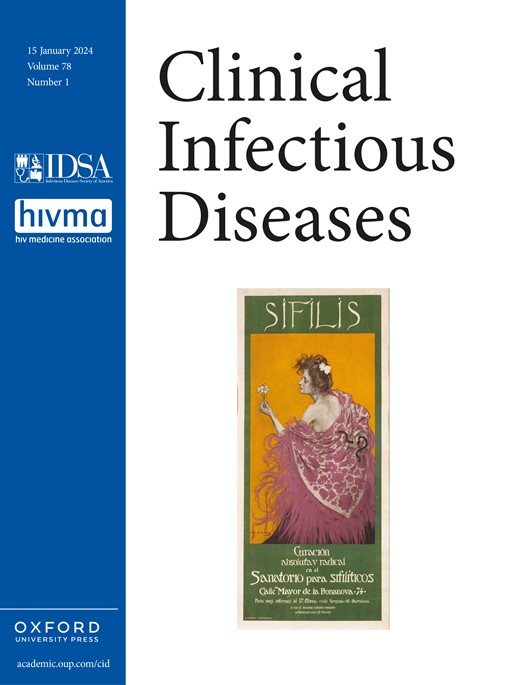使用雷米地韦对因 COVID-19 住院的易感患者进行管理:美国医院死亡率回顾性比较效果研究
IF 8.2
1区 医学
Q1 IMMUNOLOGY
引用次数: 0
摘要
背景 COVID-19 仍是一个重大的公共卫生问题,病例持续复发,住院患者有很大的死亡风险。雷米地韦已成为 COVID-19 住院患者的标准治疗方案。鉴于该疾病的持续发展,临床管理需要依靠当前流行期的证据。方法 利用 PINC AI Healthcare 数据库,评估了 2021 年 12 月至 2024 年 2 月期间初诊为 COVID-19 的住院成人使用雷米替韦的效果。分析了三个组群:成人、老年人(≥65 岁)和有记录的 COVID-19 肺炎患者。分析按氧气需求进行分层。使用倾向得分匹配法将接受雷米替韦治疗的患者与未接受雷米替韦治疗的患者进行配对。采用 Cox 比例危险度模型检测院内死亡率。结果 纳入了 169,965 名因 COVID-19 住院的成人,其中 94,129 人(55.4%)在住院头两天开始使用雷米替韦。与未使用雷米替韦相比,未使用补充氧气(NSOc)的患者死亡率明显降低(aHR [95% CI]:14 天,0.75 [0.69-0.82];28 天,0.77 [0.72-0.83]),使用补充氧气(SOc)的患者死亡率也明显降低(aHR [95% CI]:14 天,0.76 [0.72-0.83];28 天,0.77 [0.72-0.83]):14天,0.76 [0.72-0.81];28天,0.79 [0.74-0.83])(均为 p<0.0001)。老年患者和因 COVID-19 肺炎住院的患者也观察到了类似的结果。结论 这些证据借鉴了大流行时期随机对照试验的经验,为临床实践提供了参考。雷米地韦能显著降低住院患者(包括老年人和 COVID-19 肺炎患者)的死亡率。本文章由计算机程序翻译,如有差异,请以英文原文为准。
Management of vulnerable patients hospitalized for COVID-19 with remdesivir: a retrospective comparative effectiveness study of mortality in US hospitals
Background COVID-19 remains a major public health concern, with continued resurgences of cases and substantial risk of mortality for hospitalized patients. Remdesivir has become standard-of-care for hospitalized COVID-19 patients. Given the continued evolution of the disease, clinical management relies on evidence from the current endemic period. Methods Using the PINC AI Healthcare database, effectiveness of remdesivir was evaluated among adults hospitalized with a primary diagnosis of COVID-19 between December 2021 and February 2024. Three cohorts were analysed: adults, elderly (≥65 years), and those with documented COVID-19 pneumonia. Analyses were stratified by oxygen requirements. Patients receiving remdesivir were matched to those not receiving remdesivir using propensity score matching. Cox proportional hazards models were used to examine in-hospital mortality. Results 169,965 adults hospitalized for COVID-19 were included, of which 94,129 (55.4%) initiated remdesivir in the first two days of hospitalization. Remdesivir was associated with a significantly lower mortality rate as compared to no remdesivir among patients with no supplemental oxygen charges (NSOc) (aHR [95% CI]: 14-day, 0.75 [0.69-0.82]; 28-day, 0.77 [0.72-0.83]) and among those with supplemental oxygen charges (SOc): 14-day, 0.76 [0.72-0.81]; 28-day, 0.79 [0.74-0.83]) (p<0.0001, for all). Similar findings were observed for elderly patients and those hospitalized with COVID-19 pneumonia. Conclusions This evidence builds on learnings from randomized controlled trials from the pandemic era to inform clinical practices. Remdesivir was associated with significant reduction in mortality for hospitalized patients including the elderly and those with COVID-19 pneumonia.
求助全文
通过发布文献求助,成功后即可免费获取论文全文。
去求助
来源期刊

Clinical Infectious Diseases
医学-传染病学
CiteScore
25.00
自引率
2.50%
发文量
900
审稿时长
3 months
期刊介绍:
Clinical Infectious Diseases (CID) is dedicated to publishing original research, reviews, guidelines, and perspectives with the potential to reshape clinical practice, providing clinicians with valuable insights for patient care. CID comprehensively addresses the clinical presentation, diagnosis, treatment, and prevention of a wide spectrum of infectious diseases. The journal places a high priority on the assessment of current and innovative treatments, microbiology, immunology, and policies, ensuring relevance to patient care in its commitment to advancing the field of infectious diseases.
 求助内容:
求助内容: 应助结果提醒方式:
应助结果提醒方式:


